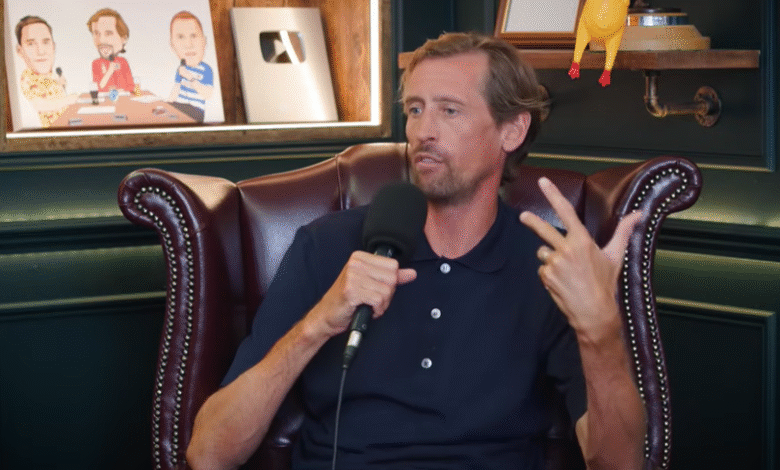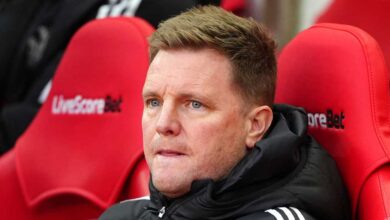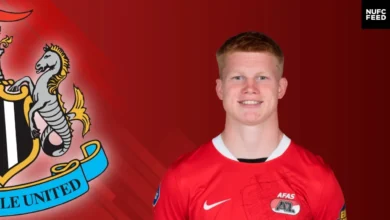“Newcastle United’s HEART-WRENCHING Transfer SHOCKER Leaves Fans in Tears as Peter Crouch EXPLODES Over ‘DISGRACEFUL’ Rules – You Won’t Believe What Happened!”
Leeds United Submit Offer for Sean Longstaff as Newcastle Eye Full Profit from Potential Sale

- Sean Longstaff has enjoyed a memorable journey at Newcastle United, with 214 appearances and iconic moments like his goals against PSG and Southampton under the lights at St James’ Park, or the decisive penalty at Nottingham Forest.
He was also a part of the squad that ended the club’s 70-year wait for a major domestic trophy.
It’s been a dream career for the local lad, but if Longstaff ends up moving to Leeds United, it feels like the timing is right—especially as it’s now been seven months since his last Premier League start for his boyhood club.
Still, any potential exit would be far from emotionless. It goes deeper than terms like “pure profit” or “PSR” (Profit and Sustainability Rules).
Newcastle head coach Eddie Howe previously expressed unease about letting go of academy products, particularly after the sale of Elliot Anderson, a player the club had nurtured since childhood.
Club CEO Darren Eales also admitted that such decisions can feel “a bit perverse.”
Former England striker Peter Crouch recently spoke out about his concern over this trend in football, where clubs are compelled to cash in on homegrown players to balance the books. “Fans love them,” he said.
“If you’re a Geordie playing for Newcastle, or someone who’s come through the ranks, it should be special.
But now, it’s like Steven Gerrard would be seen as a huge asset Liverpool could sell. Who wants that?”
Crouch also referenced John Terry and Conor Gallagher, pointing to how clubs could theoretically command large fees for these players simply because they were academy graduates. “That’s not good for our game, is it?” he added.
The PSR framework, however, has created strange dynamics. Chelsea, for instance, have actively used the system to their advantage, not only selling academy players but also offloading assets like their women’s team to remain compliant while continuing with high spending.
While some young players left Stamford Bridge before reaching their full potential—like Tino Livramento, sold to Southampton for just £5.3m, or Marc Guehi, who joined Crystal Palace for £21m—the club still raked in large amounts.
Football finance expert Kieran Maguire estimated that Chelsea earned approximately £907m in player sales over the past decade, nearly double Manchester City’s £584m.
Since 2021 alone, Chelsea have generated £242.8m through the sales of Mason Mount, Ian Maatsen, Tammy Abraham, Conor Gallagher, Kurt Zouma, Fikayo Tomori, and Omari Hutchinson, not to mention a slew of other lesser-known departures.
Newcastle, by contrast, have not historically excelled in the transfer market.
Starting from a lower base and lacking the same long-term academy investment, their average profit from player sales over a recent three-year span was just £12m.
In comparison, the Premier League’s so-called “big six” averaged £156m, and even the remaining clubs brought in over £60m on average.
This financial gap is why Newcastle had to sell both Elliot Anderson and Yankuba Minteh before the financial year closed in June, narrowly avoiding a PSR violation.
Club executives made it clear they do not want to be in that position again. Since then, they’ve moved on players like Miguel Almiron and Lloyd Kelly—and now, potentially, Longstaff.
Instead of losing him for nothing when his contract expires in 12 months, Newcastle could recoup around £10m if they sell him now.
That sum would cover the first-year amortised cost of a signing like Anthony Elanga, who arrived for £55m. In today’s PSR-influenced environment, such financial balancing is crucial.
As Howe said earlier this year: “Trading is probably the most important short-term way [to stay compliant] without a new stadium and all the other things we’ve discussed many times. It’s taken on huge importance.
“I’m not going to go on about Newcastle’s trading history, but just in recent windows, it hasn’t been straightforward.
We’re trying our best to navigate through the situation and stick to the rules.”



